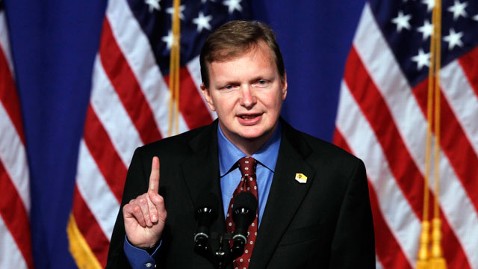Messina’s Map: Multiple Paths to 270 For Obama, Running Through Midwest

ABC News’ Devin Dwyer and Michael Falcone report:
Ask the man overseeing President Obama’s bid for a second term about the most direct path to 270 electoral votes and he’ll tell you about the kids he doesn’t have.
Jim Messina described multiple state-by-state scenarios for recapturing the White House in 2012 during a recent interview with ABC News, likening them to would-be children among whom he “absolutely” would never pick a favorite.
“We’ve always said this year what we’ve got to do is stay on the ground, put as many states as we can into play, have as many paths to 270 electoral votes and then raise money. And that’s what we’re doing,” Messina said from his sixth floor Chicago office overlooking Millenium Park.
“We’re preparing for a close election no matter what,” he added. “We should assume anyone and everyone will be tough as a nominee, and given historical elections in this country and how divided the country is on politics, that’s probably where we’ll be.”
Messina, an avid college football fan, compared the electoral roadmap for Obama to a patch-work of collegiate athletic conferences: a “PAC 10 path” sweeping through Washington, California, Nevada and Colorado and an “ACC and SEC path” that cobbles together Virginia, North Carolina and Florida.
But the political maven and former deputy White House chief of staff voiced the greatest optimism for Obama’s chances in the “Big Ten” states of the Midwest, where Democrats have been buoyed by pro-union organizing victories in Wisconsin and Ohio, robust volunteer recruitment in Iowa and a lingering popularity of the auto industry bailout in Michigan and across the region.
Messina credited a year of mobilizing that was inspired by Republican Gov. Scott Walker and his efforts to curtail collective bargaining rights in Wisconsin with boosting Obama’s chances in the polls.
Fifty-one percent of Wisconsin voters now say Obama deserves another four years, according to a Wisconsin Public Radio-St. Norbert College poll released last week. While Obama’s approval rating – 53 percent in the same poll – is up 10 points from a low last fall, just as Walker was swept into office.
“That is in part a story about enthusiasm and in part a story about the other side trying to do some policies that people don’t agree with,” Messina said, referring to Walker’s effort to curtail collective bargaining rights in the state.
In August, Democrats successfully ousted two Republican state senators in a recall vote sparked by the bargaining rights spat, but they fell short in a bid to win control of the state senate.
Still, Messina says the exercise taught Obama’s 2012 campaign a “valuable lesson.”
“We now have more neighborhood teams and more volunteers in Wisconsin than in any state in the country,” he said, “and that is something we can build on for the future and that is in part a story about local control of our campaigns.”
The unmarried 42-year-old — who jokes that he’s the “father” of an 82-pound Rottweiler named “Craig” — says he’s encouraged by similar grassroots Democratic engagement seen in Ohio and Florida, all prompted by Republican-spurred controversies over union or voting rights unforeseen just two years ago.
But it’s demographic changes – evident in new census data – that Messina says signal the greatest opportunities for Obama in states he lost in 2008.
Aides have talked up population shifts in purpling Georgia, home to a significant number of African-American voters, Latinos and transplants from blue states, while touting the prevalence of young voters in Pennsylvania and Virginia, though the latter remains a “toss-up,” Messina said.
And in Arizona, which Obama lost by 9 points four years ago, Team Obama sees the greatest chance for an electoral gain.
“We really look at Arizona and see a state where we can go and expand the electorate, register a whole bunch of young people and traditional Democrats and Latinos that have never been registered before,” Messina said.
Democrats have shown they are serious about making a push in the southwest border state, actively organizing around the recall of powerful Republican state senate president Russell Pearce (who authored SB 1070) and spending big money — the largest DNC advertising buy of the 2012 campaign — to blast Mitt Romney for his comments on the home mortgage crisis.
“Arizona’s probably the only state in the country that didn’t get a real campaign in ’08 because it was a McCain state,” Messina said. “We’re going to play in Arizona and I’m excited about it.”